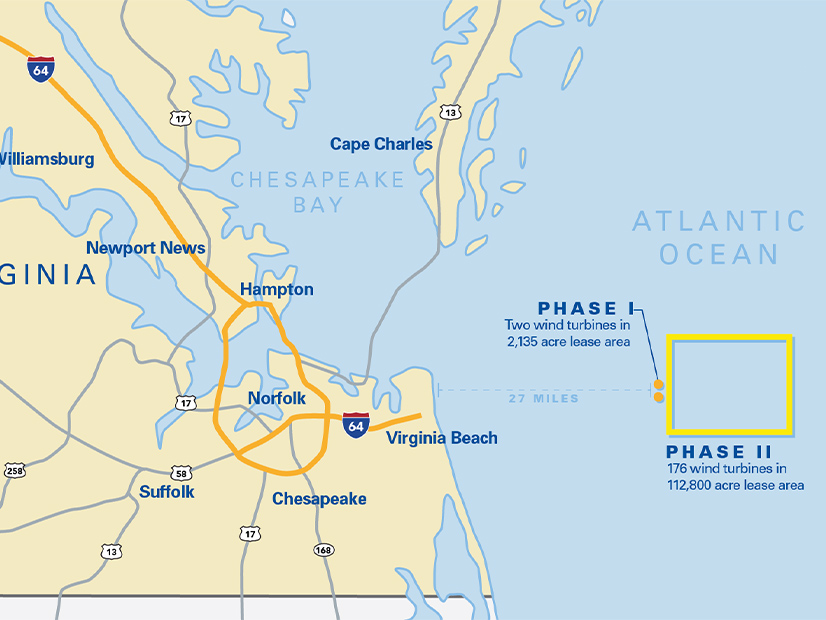
Dominion Energy’s (NYSE:D) proposed offshore wind project won support from labor and political leaders in four days of hearings before the Virginia State Corporation Commission (SCC) last week, while commission staff called for ratepayer protections and local residents sought changes to transmission routing (PUR-2021-00142).
“There are many challenges facing mega-projects such as this,” observed Senior Assistant Attorney General C. Meade Browder Jr. of the Division of Consumer Counsel in remarks on the second day of the hearings May 16-19.
Hearings are scheduled to resume on Tuesday. The SCC is expected to reach a decision by August.
Virginia Beach Mayor Bobby Dyer (R) testified in support of the 2.6-GW Coastal Virginia Offshore Wind (CVOW) project, saying Dominion “has kept the city well-informed every step of the way.”
In addition to the obvious benefit of generating an anticipated 9,500 GWh of carbon-free energy per year, the jobs and economic impact that go along with this project are a critical part of a game-changing environment for us,” Dyers said in written testimony. “According to Dominion, the CVOW project will bring over 1,000 jobs to our area at all skill levels [and] over $10 million annually in local and state tax revenue is expected.”
In written comments, state Del. Shelly Simonds (D) expressed “strong support” for the project, citing “the urgent need for bold action to address climate change.”
Jason Parker, of the Virginia State Building and Construction Trades Council, said the council believes “that it’s going to bring lots of good jobs to the Tidewater area and to Virginia. We believe that it’s smart economics to diversify our energy source portfolio.”
Transmission Line Routing Questioned
Residents of a neighborhood where Dominion is proposing to build transmission lines for CVOW were less excited. Although not opposing the entire project, Virginia Beach resident Jacob Gotliboski testified May 16 that when he and his wife bought their home a year ago, they checked with the city and were told there was no project pending behind their home. He requested that the power lines be placed underground instead of becoming “an eyesore in our backyard.”
Ian Brown, president of the Mayberry Homeowners’ Association in Virginia Beach, who said he was also speaking on behalf of three neighboring homeowners’ associations, testified May 17 that he was there to “plead with the SCC to require Dominion Energy to use one of their alternate routes” instead of siting the transmission lines nearby.
Protecting Ratepayers
Probably the biggest question still hanging over CVOW, however, concerns its rising cost, and how much of it ratepayers will have to absorb. In November, Dominion announced that the projected cost had increased by more than 20% to $9.8 billion, citing “commodity and general cost pressures.” (See Dominion’s OSW Project to Cost $9.8B, up from $8B.) Testifying May 17, Joshua Bennett, vice president for offshore wind at Dominion, revised that figure to $9.65 billion, a reduction of 1.5%.
In testimony filed with the SCC, commission staff and the state attorney general’s Division of Consumer Counsel questioned the cost of the project and called for a performance guarantee on the project’s capacity factor. (See Va. AG, SCC Staff Question Costs on Dominion’s OSW Project.)
Browder testified May 17 that there is a need to “avoid problems like they had in South Carolina and Georgia, where ratepayers were left holding the bag.” He was referring to two nuclear projects — Santee Cooper’s V.C. Summer, which was cancelled, and Georgia Power’s Vogtle, which is still under construction — both of which had major budget overruns.
SCC staffer Katya Kuleshova said the record “may or may not support” granting the project a presumption of reasonableness and prudence because staff identified “certain scenarios” in which it could exceed the 1.4 levelized cost of energy (LCOE) metric, or $12.4 billion in costs incurred prior to the commercial operations date.
If the commission does approve the project, staff said it should require a performance guarantee to mitigate the risks to ratepayers. It suggested protections similar to those imposed by the commission over the construction of the 610-MW coal-fired Virginia City Hybrid Energy Center, in which it said Dominion would be required to prove the prudence of any cost overruns above $1.8 billion (PUE-2007-00066).
In comments filed May 16, John Warren, director of the Commonwealth’s Department of Energy, noted that the public interest declaration in state law “requires that the projected levelized cost of energy of the project does not exceed 1.4 times the comparable cost of a conventional simple cycle combustion turbine generating facility.” He said the company should be required to guarantee the 42% capacity factor it used in computing the project’s LCOE.


